That Ol’ Chart Of Mine Makes The Rounds Online Periodically And It Drives Me Crazy Because It’s Frankly
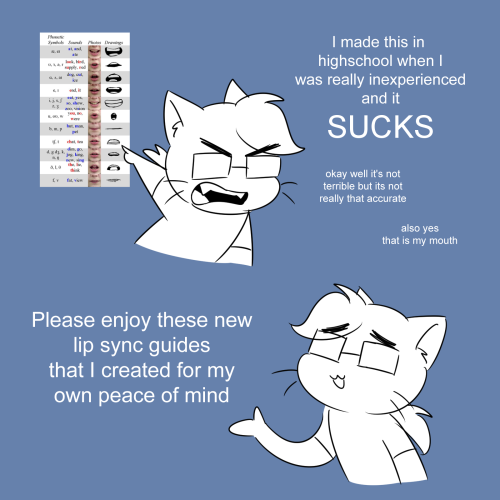

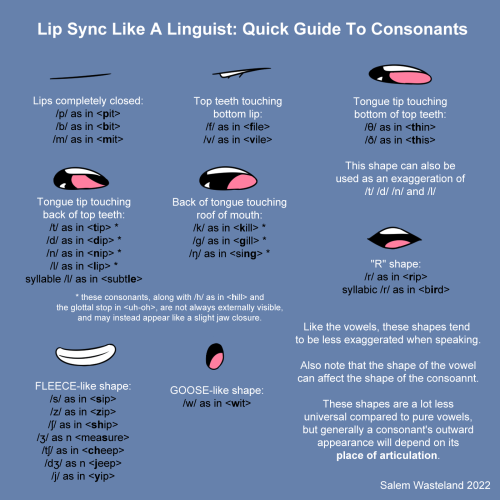
That ol’ chart of mine makes the rounds online periodically and it drives me crazy because it’s frankly not very good. So, I finally got around to remaking it.
I doubt this will get anywhere near as popular, but I wanted to make it.
Good reference for animation, comics, and for visualizing phonetics!
More Posts from 0-0malik and Others


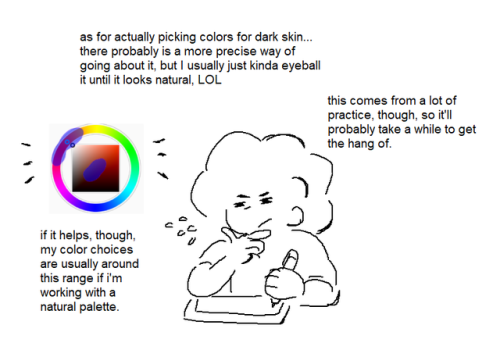
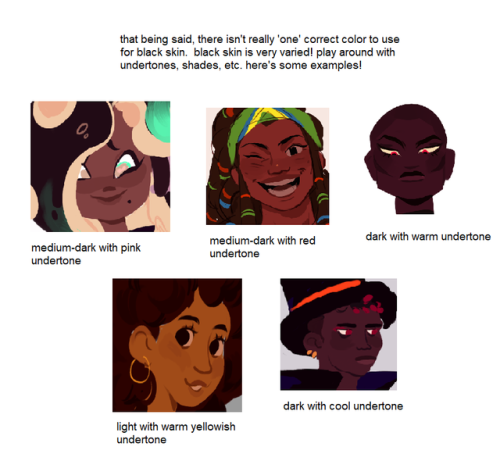

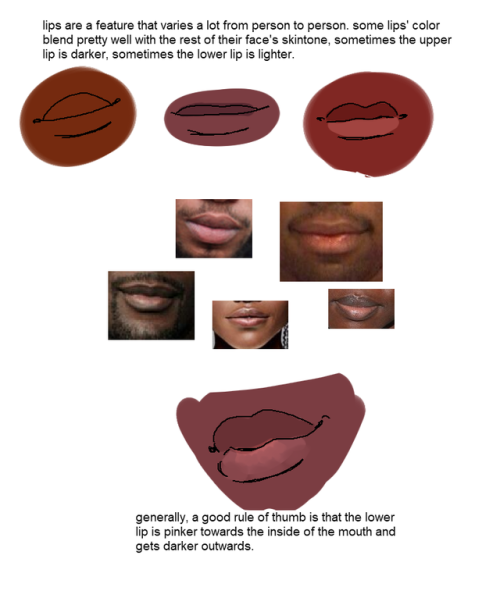

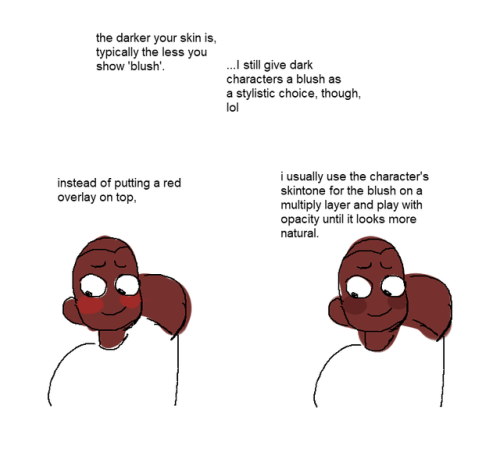

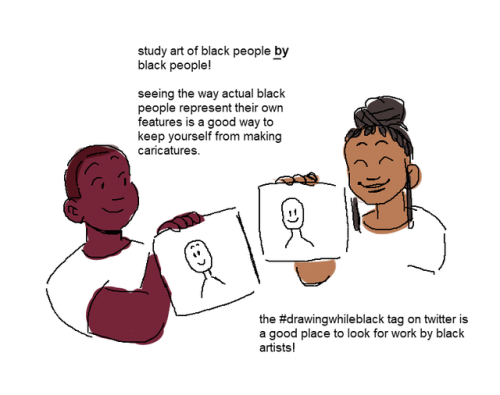

I get asked a lot for tips with coloring black people, so i put together a little tutorial! (and bumps my kofi if you found this helpful)
How to learn a language when you don’t know where to start:
General Plan:
Weeks 1 and 2: Purpose:
Learn the fundamentals sentence construction
Learn how to spell and count
Start building a phrase stockpile with basic greetings
The Alphabet
Numbers 1 - 100
Subject Pronouns
Common Greetings
Conjugate the Two Most Important Verbs: to be and to have
Basic Definite and Indefinite Articles
Weeks 3 and 4: Purpose:
Learn essential vocabulary for the day-to-day
Start conjugating regular verbs
Days of the Week and Months of the Year
How to tell the time
How to talk about the weather
Family Vocabulary
Present Tense Conjugations Verbs
Weeks 5 and 6: Purpose:
Warm up with the last of the day-to-day vocabulary
Add more complex types of sentences to your grammar
Colours
House vocabulary
How to ask questions
Present Tense Conjugations Verbs
Forming negatives
Weeks 7 and 8: Purpose:
Learn how to navigate basic situations in a region of your target language country
Finish memorising regular conjugation rules
Food Vocabulary and Ordering at Restaurants
Money and Shopping Phrases
Present Tense Conjugations Verbs
Weeks 9 and 10: Purpose:
Start constructing descriptive and more complex sentences
Adjectives
Reflective verbs
Places vocabulary
Weeks 11 and 12: Purpose:
Add more complex descriptions to your sentences with adverbs
Wrap up vocabulary essentials
Adverbs
Parts of the body and medical vocabulary
Tips for Learning a Foreign Language:
Learning Vocabulary:
What vocabulary should I be learning?
There are hundreds of thousands of words in every language, and the large majority of them won’t be immediately relevant to you when you’re starting out.Typically, the most frequent 3000 words make up 90% of the language that a native speaker uses on any given day. Instead try to learn the most useful words in a language, and then expand outwards from there according to your needs and interests.
Choose the words you want/need to learn.
Relate them to what you already know.
Review them until they’ve reached your long-term memory.
Record them so learning is never lost.
Use them in meaningful human conversation and communication.
How should I record the vocabulary?
Learners need to see and/or hear a new word of phrase 6 to 17 times before they really know a piece of vocabulary.
Keep a careful record of new vocabulary.
Record the vocabulary in a way that is helpful to you and will ensure that you will practice the vocabulary, e.g. flashcards.
Vocabulary should be organised so that words are easier to find, e.g. alphabetically or according to topic.
Ideally when noting vocabulary you should write down not only the meaning, but the grammatical class, and example in a sentence, and where needed information about structure.
How should I practice using the vocabulary?
Look, Say, Cover, Write and Check - Use this method for learning and remembering vocabulary. This method is really good for learning spellings.
Make flashcards. Write the vocabulary on the front with the definition and examples on the back.
Draw mind maps or make visual representations of the new vocabulary groups.
Stick labels or post it notes on corresponding objects, e.g when learning kitchen vocabulary you could label items in your house.
How often should I be practising vocabulary?
A valuable technique is ‘the principle of expanding rehearsal’. This means reviewing vocabulary shortly after first learning them then at increasingly longer intervals.
Ideally, words should be reviewed:
5-10 minutes later
24 hours later
One week later
1-2 months later
6 months later
Knowing a vocabulary item well enough to use it productively means knowing:
Its written and spoken forms (spelling and pronunciation).
Its grammatical category and other grammatical information
Related words and word families, e.g. adjective, adverb, verb, noun.
Common collocations (Words that often come before or after it).
Receptive Skills: Listening and Reading
Reading is probably one of the most effective ways of building vocabulary knowledge.
Listening is also important because it occupies a big chunk of the time we spend communicating.
Tips for reading in a foreign language:
Start basic and small. Children’s books are great practice for beginners. Don’t try to dive into a novel or newspaper too early, since it can be discouraging and time consuming if you have to look up every other word.
Read things you’ve already read in your native language. The fact that you at least know the gist of the story will help you to pick up context clues, learn new vocabulary and grammatical constructions.
Read books with their accompanying audio books. Reading a book while listening to the accompanying audio will improve your “ear training”. It will also help you to learn the pronunciation of words.
Tips for listening in a foreign language:
Watch films in your target language.
Read a book while also listening along to the audio book version.
Listen to the radio in your target language.
Watch videos online in your target language.
Activities to do to show that you’ve understood what you’ve been listening to:
Try drawing a picture of what was said.
Ask yourself some questions about it and try to answer them.
Provide a summary of what was said.
Suggest what might come next in the “story.”
Translate what was said into another language.
“Talk back” to the speaker to engage in imaginary conversation.
Productive Skills: Speaking and Writing
Tips for speaking in a foreign language:
If you can, try to speak the language every day either out loud to yourself or chat to another native speaker whether it is a colleague, a friend, a tutor or a language exchange partner.
Write a list of topics and think about what you could say about each one. First you could write out your thoughts and then read them out loud. Look up the words you don’t know. You could also come up with questions at the end to ask someone else.
A really good way to improve your own speaking is to listen to how native speakers talk and imitate their accent, their rhythm of speech and tone of voice. Watch how their lips move and pay attention to the stressed sounds. You could watch interviews on YouTube or online news websites and pause every so often to copy what you have just heard. You could even sing along to songs sung in the target language.
Walk around the house and describe what you say. Say what you like or dislike about the room or the furniture or the decor. Talk about what you want to change.This gets you to practise every day vocabulary.
Tips for writing in a foreign language:
Practice writing in your target language. Keep it simple to start with. Beginner vocabulary and grammar concepts are generally very descriptive and concrete.
Practice writing by hand. Here are some things you can write out by hand:
Diary entries
Shopping lists
Reminders
What could I write about?
Write about your day, an interesting event, how you’re feeling, or what you’re thinking.
Make up a conversation between two people.
Write a letter to a friend, yourself, or a celebrity. You don’t need to send it; just writing it will be helpful.
Translate a text you’ve written in your native language into your foreign language.
Write a review or a book you’ve recently read or a film you’ve recently watched.
Write Facebook statuses, Tweets or Tumblr posts (whether you post them or not will be up to you).
Write a short story or poem.
Writing is one of the hardest things to do well as a non-native speaker of a language, because there’s no room to hide.
There are lots of ways to improve your writing ability, but they can be essentially boiled down to three key components:
Read a lot
Write a lot
Get your writing corrected





So I may have did a (most likely to never be finished) BSD comic of soukoku.
hope you guys like it.








Download this free brushset here!
Contributions greatly appreciated but not necessary! Can’t wait to see what everyone creates with these. Please open the “README” txt document first for full install instructions and a link to the video downloads.
Stuff kids on tumblr better relearn
1. You are responsible for your own media experience.
2. There is such a thing as a healthy level of avoidance towards topics that make you feel unwell or even (in a real-life clinical definition of the term) trigger you - but you are the one to actively take care of what you view.
3. Avoiding does not mean policing others.
4. You have no right to tell artists to censor themselves - you may criticize what others do, you may dislike it, that’s fine - but actively asking for censorship when you could easily unfollow or block a person just makes you look incompetent in your use of the internet.
5. Do not give people on tumblr or /any/ website the responsibility for your emotional well-being. Because these people do not even know you so no, you have no right to ask them to take care of you.
Please do not let debt collectors play in your face.
















Every time I wrote your name, I lied. Every time I wrote your name, it was the truth.
1.Clarice Lispector | 2.Nickie Zimov | 3.Warsan Shire | 4.Pablo Neruda | 5.Madeline Miller | 6.Nickie Zimov | 7.Madeline Miller | 8.Vincent van Gogh | 9.James Joyce | 10.Nick Lantz | 11.Ocean Vuong | 12.Nickie Zimov | 13.Richard Brautigan | 14.Keaton St. James

Currently reading^, it's a romance and since it Valentine's Day, I thought it apt to make a fanart of it.
People joke about Dazai and Chuuya being romantically experienced or whatever, but I think it's the opposite. Chuuya doesn't know what that stuff is because Mori thinks it's funny




-
 omegajor liked this · 3 days ago
omegajor liked this · 3 days ago -
 flandesuka liked this · 4 days ago
flandesuka liked this · 4 days ago -
 farceargon liked this · 4 days ago
farceargon liked this · 4 days ago -
 the-silver-sparrow reblogged this · 4 days ago
the-silver-sparrow reblogged this · 4 days ago -
 the-silver-sparrow liked this · 4 days ago
the-silver-sparrow liked this · 4 days ago -
 chandaza liked this · 5 days ago
chandaza liked this · 5 days ago -
 noxernia reblogged this · 6 days ago
noxernia reblogged this · 6 days ago -
 the-cannibal-canine liked this · 6 days ago
the-cannibal-canine liked this · 6 days ago -
 samarill reblogged this · 6 days ago
samarill reblogged this · 6 days ago -
 samarill liked this · 6 days ago
samarill liked this · 6 days ago -
 nexylaza reblogged this · 6 days ago
nexylaza reblogged this · 6 days ago -
 gentleobservations liked this · 6 days ago
gentleobservations liked this · 6 days ago -
 prixoruno liked this · 6 days ago
prixoruno liked this · 6 days ago -
 the-post-crow reblogged this · 1 week ago
the-post-crow reblogged this · 1 week ago -
 the-shiny-post-hoard reblogged this · 1 week ago
the-shiny-post-hoard reblogged this · 1 week ago -
 the-post-crow liked this · 1 week ago
the-post-crow liked this · 1 week ago -
 catgirldragon reblogged this · 1 week ago
catgirldragon reblogged this · 1 week ago -
 rosealena-4 liked this · 1 week ago
rosealena-4 liked this · 1 week ago -
 blairefull liked this · 1 week ago
blairefull liked this · 1 week ago -
 old-daemon-farts reblogged this · 1 week ago
old-daemon-farts reblogged this · 1 week ago -
 pokilicious reblogged this · 1 week ago
pokilicious reblogged this · 1 week ago -
 pokilicious liked this · 1 week ago
pokilicious liked this · 1 week ago -
 weltato reblogged this · 1 week ago
weltato reblogged this · 1 week ago -
 weltato reblogged this · 1 week ago
weltato reblogged this · 1 week ago -
 weltato reblogged this · 1 week ago
weltato reblogged this · 1 week ago -
 inprisonforsparkling reblogged this · 1 week ago
inprisonforsparkling reblogged this · 1 week ago -
 ongoingmunchies39 liked this · 1 week ago
ongoingmunchies39 liked this · 1 week ago -
 1themuffinman1 reblogged this · 1 week ago
1themuffinman1 reblogged this · 1 week ago -
 1themuffinman1 liked this · 1 week ago
1themuffinman1 liked this · 1 week ago -
 lagunaneptune liked this · 1 week ago
lagunaneptune liked this · 1 week ago -
 asterthejester0 liked this · 1 week ago
asterthejester0 liked this · 1 week ago -
 dexiumdelphi reblogged this · 1 week ago
dexiumdelphi reblogged this · 1 week ago -
 dexiumdelphi liked this · 1 week ago
dexiumdelphi liked this · 1 week ago -
 mostcertainlynotcis reblogged this · 1 week ago
mostcertainlynotcis reblogged this · 1 week ago -
 galaxy-starshine reblogged this · 1 week ago
galaxy-starshine reblogged this · 1 week ago -
 indigochromatic reblogged this · 1 week ago
indigochromatic reblogged this · 1 week ago -
 mad-harmonics liked this · 1 week ago
mad-harmonics liked this · 1 week ago -
 greenpumpkinart liked this · 1 week ago
greenpumpkinart liked this · 1 week ago -
 wisesweetsmilkshake liked this · 1 week ago
wisesweetsmilkshake liked this · 1 week ago -
 mfemks liked this · 1 week ago
mfemks liked this · 1 week ago -
 sharasellarine liked this · 1 week ago
sharasellarine liked this · 1 week ago -
 toasters0422 liked this · 1 week ago
toasters0422 liked this · 1 week ago -
 ishika-star reblogged this · 1 week ago
ishika-star reblogged this · 1 week ago -
 jumpscart liked this · 1 week ago
jumpscart liked this · 1 week ago -
 draculizing reblogged this · 1 week ago
draculizing reblogged this · 1 week ago -
 vainvex reblogged this · 1 week ago
vainvex reblogged this · 1 week ago -
 wiingdings reblogged this · 1 week ago
wiingdings reblogged this · 1 week ago

A place where I express all my obsession through art. PLEASE DO NOT REPOST any of my works.
167 posts






